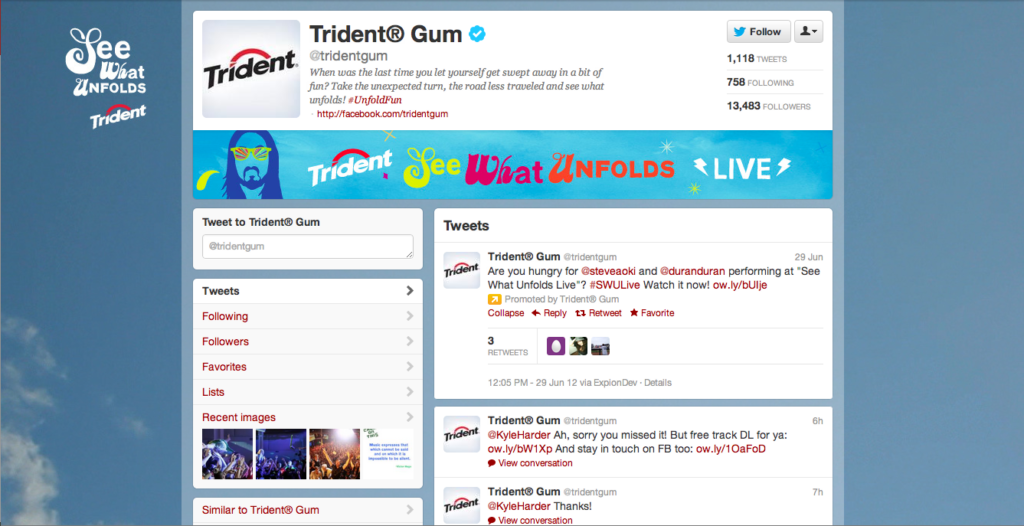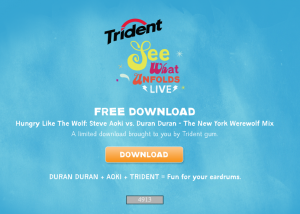On February 8, the new Asheville House Music Society Radio show launched on Asheville, NC community radio station, AshevilleFM.org. The shows airs at Midnight each Saturday and into Sunday morning until 2 am. Listen live on 103.3 LP-FM on the radio dial or tune-in live on AshevilleFM.org or via the TuneIn app for iOS and Android devices.
Tag: DJ
@8tracks playlist: Visions of a Sky 2
I was inspired to create @8tracks Visions of a Sky 2 playlist. It's my second playlist featuring warm, lush synth pads, melodic melodies and vocal stylings to move your mind, body and soul.
Take a minute to teach
Sharing your gift is important. What you teach others can help them traverse the world and see things they never would have seen. There is nothing more important than teaching and paying it forward.
Deep Moments In My Melodic Soul
[8tracks url=”https://8tracks.com/djtonyz/deep-moments-in-my-melodic-soul/edit” ]
Wireless DJ or a fraud? You be the judge
So, one of my DJ friends on Facebook, Curtis Atchinson, posted a YouTube video on Facebook today of a DJ on day-time TV somewhere in Russia or the Ukraine spinning CDs while a singer performs the backing vocals to a track. If you look closely, there are NO WIRES attaching the Pioneer CD decks to the mixer. Nor is their any electricity going to ANYTHING!
This is just plan fraudulent! It makes Milli Vanilli look like the Rolling Stones. One of the most egregious, fraudulent DJ sets I’ve ever seen with my own two eyes.
Okay, so maybe it’s a day-time TV show. Maybe they didn’t outlets nearby. Maybe some set designer was too concerned about wires that would clutter the front of the set. Really? They couldn’t plug anything in?
We’ll never know if this DJ has any talent whatsoever, but he’ll have a lot of explaining to do when this video takes off virally across the web and his DJ career is ruined, because no one will ever trust that he’s actually playing the music at his gigs.
Of course, she’s lip-syncing too. Fraudulent bliss, for sure.
Netmix Global House Sessions Podcast Episode 11
DJ Tony Z's Netmix Global House Sessions Podcast #11 streaming on MixCloud.com.
Trident, Steve Aoki and Duran Duran come together for a social music campaign
 You know electronic dance music (otherwise known as EDM) has truly hit the mainstream when big brands get into bed with DJs who are rock stars, rock stars who are simply rock stars, or a mash-up of both. Big brands have been down with EDM for some time. Red Bull was practically invented for nightclubs and Absolut has always done cool stuff with the genre for years. Of course, those brands had a vested interest in club culture, because that’s where their products are generally consumed.
You know electronic dance music (otherwise known as EDM) has truly hit the mainstream when big brands get into bed with DJs who are rock stars, rock stars who are simply rock stars, or a mash-up of both. Big brands have been down with EDM for some time. Red Bull was practically invented for nightclubs and Absolut has always done cool stuff with the genre for years. Of course, those brands had a vested interest in club culture, because that’s where their products are generally consumed.
For their “See What Unfolds” campaign, Trident, a division of Kraft Foods and makers of the popular chewing gum of the same name, virtually unfolded (pun intended) a YouTube, Facebook and Twitter, which put rock star DJ, Steve Aoki together with true 80’s rock stars, Duran Duran.

First, let’s put aside the fact that gum is a virtual anathema to nightclubs. For as long as we can remember, nightclubs have pleaded with punters to leave their gum at home, lest they have to peel the sticky stuff off of the underside of champagne soaked tables. Well, maybe Trident didn’t get that message, but that’s okay. We know big brands don’t really do their homework when it comes to the fine details. Chalk it up to a rookie mistake. Sort of like Justin Bieber’s publicist pitching a scoop on the teen pop-star to XXL Magazine.
It all started on June 13, when Trident published a Tweet on their Twitter account @tridentgum announcing tickets for the first in a series of national “See What Unfolds” events at Brooklyn’s Terminal 5.
After an hour of Aoki warming up the crowd, Trident tweeted Duran Duran’s appearance on stage.
In preparation for the campaign with Aoki and Duran Duran, Trident put the superstars together in the studio, where they collaborated on an updated remix of the classic, “Hungry Like The Wolf.” The resulting New York Werewolf Mix stays true to the vocal integrity of the original, while soaring, epic Trance-oriented stabs instantly transform the song into something you might hear in a peak-our set at a summer EDM festival.
To spur viral action on the campaign, the video above was released on YouTube and that track was made available as a free download from Trident’s Facebook page.

Fans could remix the video using the radio version of the .mp3 and footage and images available for download at Genero.TV. Winners were announced on June 27th.
See the full story in Ad Age here: https://bit.ly/KLa5qh
Netmix Global House Sessions Podcast – November 2011
When I’m not toiling away in OmniGraffle, creating site maps, wireframes, and associated product documentation, you can find me creating DJ mixes using the digital audio workstation, Ableton Live. Before I got involved in building and managing really cool web products, I was a DJ in the Boston area. And, that’s where, in 1995, I launched Netmix.com. It was the first DJ culture website in the world to broadcast globally renowned DJs in the mix.
I originally ran the site out of my apartment in Brookline, MA. I paid a local web development shop about $10,000 over two-years to build and host the site and Real Audio streams. In 1996, I split up with my girlfriend at the time and moved to New York City to pursue fame and fortune as one of the first online music start-ups. After 5 difficult years working p/t to pay the bills and spending nights and weekends on Netmix, I sold the company for $3.165 Million in cash and stock. While that looks like a phenomenal sum on paper, it turned gold honey pot turned to a dark bronze.
Our deal closed on June 1st, 2000. I bought a few bottles of Moët & Chandon, then popped the cork in the office we were sub-leasing from one of my former partner’s friends on University Place at 10th Street in the West Village. I remember shedding a few tears of relief, for it was a long arduous journey from growing up in subsidized housing in the Allston section of Boston, to being handed a check for $100,000 with the next payment around the corner. Unfortunately, that payment never came. The bubble had burst and our parent company couldn’t raise a nickel to keep us alive. In fact, despite our combined traffic numbers and the dedication of our content team, our sales team hadn’t sold a dollar of advertising that summer. While Netmix was on its way to generating our first $100,000 in sales that year, our parent company folded only 6 months later. The advertising market bottomed out and the writing was on the wall.
After 6-years of continuous growth, Netmix went dark. I still have all the mixes. One day I’ll put them all online again.
It’s been 11-years since those tumultuous days of what is now called “dotcom 1.0.” In 2003, I discovered WordPress, a blogging platform that allowed me to bring Netmix back online as a blog. Since that time, I have published over 400 articles and launched my podcast, the Netmix Global House Sessions. It doesn’t matter where I am or what I’m doing–Netmix will always be live. It may not be as timely or as relevant as it once was. The inconsistent publishing schedule is evident and my mixes are the only audio on the site. But, I don’t do it for the money. I do to keep alive what I first started over 16-years ago. And, who knows where it will go.
In the spirit of Netmix, here is my latest Global House Sessions podcast. You can either listen to the SoundCloud version below, or subscribe to the podcast and download it with iTunes to your desktop or iOS device.
Triangle DJ scene is a sad state of affairs
I moved from New York City to North Carolina’s Research Triangle region on August 1, 2010 for a job opportunity at the University of North Carolina at Chapel Hill School of Journalism and Mass Communication. Wikiepedia best describes the area:
The Research Triangle, also known as Raleigh-Durham and commonly referred to as simply “The Triangle“, is a region in the Piedmont ofNorth Carolina in the United States, anchored by North Carolina State University, Duke University, University of North Carolina at Chapel Hill, and cities of Raleigh, Durham, and Chapel Hill respectively.
The eight-county region, officially named the Raleigh-Durham-Cary CSA, comprises the Raleigh-Cary and Durham-Chapel Hill metropolitan areas and the Dunn Micropolitan Statistical Area. A 2009 Census Estimate put the population at 1,742,816. The Raleigh-Durham television market includes a broader 23-county area which includes Fayetteville, and has a population of 2,726,000 persons.[1]
The “Triangle” name was cemented in the public consciousness in the 1950s with the creation of Research Triangle Park, home to numerous high-tech companies and enterprises. Although the name is now used to refer to the geographic region, “The Triangle” originally referred to the universities, whose research facilities, and the educated workforce they provide, have historically served as a major attraction for businesses located in the region.
I considered moving here for two reasons. First, the region has a technology focus. Research Triangle Park houses companies like IBM, Red Hat, and Cisco. Apple, Facebook, and Google have all built data centers in the western part of the state. There’s a start-up culture rising in Durham and UNC Chapel Hill’s Chancellor, Holden Thorpe, began an Innovation Carolina initiative at the school, which looks promising. It seemed as if the time was right to leave New York City. When the opportunity presented itself, we decided to make the change.
The second reason I moved here is because I’d seen a semblance of a DJ culture scene. When I was considering this area, I attended a conference in Raleigh with the dual purpose of coming down for the event and scouting the area. During our stay, we happened across the Mosaic Spring Music festival, which takes place at the Mosaic Wine Lounge near Glenwood Avenue; a residential area fronted by a number of bars and restaurants.
Mosaic, for all intent and purpose, is specifically dedicated to the DJ culture. The venue attracts a trendy, professional crowd. Keith Ward both books the room and DJs himself, along with Stephen Feinberg. Keith schedules these festivals twice a year and books predominantly local DJ talent for a full week. After stumbling on what I think is one of the few jewels in the nightlife scene in Raleigh, I thought that might extend further out into Durham and Chapel Hill, but I was wrong. It doesn’t.
Once I moved down last year, I attended Sound Cartel events hosted by DJs Marshall Jones and Nugz. They’ve got something going on in trying to create a vibe for house music in the Triangle. Little by little, they are building a following. At Mosaic, I hear they draw a nice crowd. But in Chapel Hill, there’s not much going on for them, or anyone else playing true house music. It’s up and down. One night, there might be 20 people, and on another, they might get 60 to 100. Generally, the more heavily attended nights are when they bring in an outside DJ and promote it to the DJ culture community, who show up in droves to pay hommage to a legend that may grace “the decks.” As the college crowd latches onto Dubstep as the the flavor of the month, true house music seem to have been abandoned. We don’t know why.
What we do know, is that electronic music fans in the Triangle will go to large, open air music festivals or stop-over dates featuring DJs like Tiesto and Kaskade. IdentityFest kicked off in Charlotte and Tiesto played a date in Winston-Salem. That begs the question, if these people are attending DJ culture events around the state, why aren’t they supporting the club culture? Is it the economy? Any cover charge today is sneered at, especially since bars are considered social clubs and must charge a fee on top of the cover fee. I don’t know the reason why that is, but I can guess that fee is really a way to keep underage kids out of the bars. The hours? With so many parents living in this area, they’ve outgrown the desire to go out at night. Chapel Hill and Carrboro are sleepy little towns. While the college crowd hits the pubs up on East Franklin Street, anything that doesn’t target that market is going to be challenged with building a crowd.
Do these young people not identify house music as “electronic” music? Maybe. There is little, if any radio support in this area for dance/electronic music. Satellite radio is national and they don’t run local promotions for club nights, so you won’t hear advertising on the radio like you hear in other markets. College radio is predominantly hip-hop.. Local Internet radio gets a scattered following. It’s very hard to build a local audience on the Internet. There just aren’t enough listeners to sustain it, so the sites that are playing dance music are attracting an International audience, which doesn’t bode well for local attendance.
There are some venues in Chapel Hill with DJs, but those DJs are typically younger and playing to the college crowd. Sure, they are part of the fabric of DJ culture, but they’re not trying to develop a signature sound. They’re playing what’s hot. No problem with that, because there should be room for everything. But, there isn’t.
I played out twice in the last month at Durham’s Casbah, a rock club with a decent sound system and light show. On a Saturday night in Durham, I found the Brightleaf Square area, which is comprised of old, renovated tobacco warehouses with shops and restaurants, and a few free standing college oriented watering holes, to be very quiet. There was a distinct difference between Friday, where the street was busier, than Saturday where it was not at all. It seemed like a Monday night and not a Saturday.
The question then becomes, how do we change this? In an area full of soccer moms and dads, twenty-five thousand plus students from UNC and half that from Duke, where is the disconnect? It seems that the Latin themed parties attract an audience. I’ve been to a few salsa events, which were crowded and everyone was dancing. Have people forgotten how to dance to house music? Do they care?
Chapel Hill is very family oriented. If you move here, you’re either a student (undergrad or grad), or you have a family and you’re sending your kids to one of the top school systems in the country. There seems to be no in between. Migrate east toward Raleigh, and that’s where you’ll find a younger scene. But out here in Chapel Hill, it’s hard to get people out of their houses on a weekly basis.
In addition to families, the area is known for its live music venues. With that, you have to also compete with other artists trying to do their thing as well. The Independent Weekly is similar to New York’s Village Voice. It provides a smattering of coverage for EDM events, but people generally know it as covering alternative, rock, country, bluegrass, and hip-hop. I can’t say that I’ve picked it up and found a weekly update on the EDM scene. And, maybe that’s what’s needed: education.
If people don’t know, they can’t support. Maybe, they’re just not hearing it. I have some ideas, but with all my comings and goings and what I’m involved with, I’m certainly not going to be the one man army. It takes an organized and cohesive message. One bright spot is the TriangleBeats.com website and e-mail list-serve. If done correctly, Triangle Beats can serve as the conduit for people who want to learn and participate in EDM culture. It remains to be seen whether the participants can glue it together and make something happen. I’ve gotten involved on a surface level, just to give some advice. I really see EDM education as the primary driver. If TriangleBeats.com can then educate, both online and off, we may have found something. But, it’s going to take years to grow a scene. It’s not going to happen overnight.
Photos from my day at the Nasher Museum vinyl exhibit
The Nasher Museum of Art on the Duke University campus in Durham, NC presents The Record: Contemporary Art and Vinyl. The exhibit is closed to photographers, but there were a few items placed in the public areas I was allowed to shoot. It was interesting to capture people listening to albums curated by various artists whose work is featured. I tried to capture the enjoyment of music discovery.

You must be logged in to post a comment.